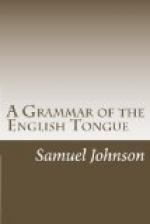Some comparatives and superlatives
are yet found in good writers formed
without regard to the foregoing
rules; but in a language subjected so
little and so lately to grammar,
such anomalies must frequently occur.
So shady is compared by Milton.
She in shadiest covert hid,
Tun’d her nocturnal note.
Par. Lost.
And virtuous.
What she wills to say or do,
Seems wisest, virtuousest, discreetest,
best. Par. Lost.
So trifling by Ray, who is indeed of no great authority.
It is not so decorous, in
respect of God, that he should immediately do
all the meanest and triflingest
things himself, without making use of
any inferior or subordinate
minister. Ray on the Creation.
Famous, by Milton.
I shall be nam’d among
the famousest
Of women, sung at solemn festivals.
Milton’s Agonistes.
Inventive, by Ascham.
Those have the inventivest
heads for all purposes, and roundest tongues
in all matters. Ascham’s
Schoolmaster.
Mortal, by Bacon.
The mortalest poisons practised
by the West Indians, have some mixture
of the blood, fat, or flesh
of man. Bacon.
Natural, by Wotton.
I will now deliver a few of
the properest and naturalest considerations
that belong to this piece.
Wotton’s Architecture.
Wretched, by Jonson.
The wretcheder are the contemners
of all helps; such as presuming on
their own naturals, deride
diligence, and mock at terms when they
understand not things.
Ben Jonson.
Powerful, by Milton.
We have sustain’d one day in doubtful
fight,
What heav’n’s great king hath
pow’rfullest to send
Against us from about his throne.
Par. Lost.
The termination in ish may be accounted in some sort a degree of comparison, by which the signification is diminished below the positive, as black, blackish, or tending to blackness; salt, saltish, or having a little taste of salt; they therefore admit no comparison. This termination is seldom added but to words expressing sensible qualities, nor often to words of above one syllable, and is scarcely used in the solemn or sublime style.
* * * * *
Of pronouns.
Pronouns, in the English language, are, I, thou, he, with their plurals, we, ye, they; it, who, which, what, whether, whosoever, whatsoever, my, mine, our, ours, thy, thine, your, yours, his, her, hers, theirs, this, that, other, another, the same, some.
The pronouns personal are irregularly inflected.
Singular. Plural.
Nom. I, We.
Accus. and Me, Us. other oblique cases.
Nom. Thou, Ye.




